The Cambridge History of Japan, Vol. 4: Early Modern Japan
Подождите немного. Документ загружается.

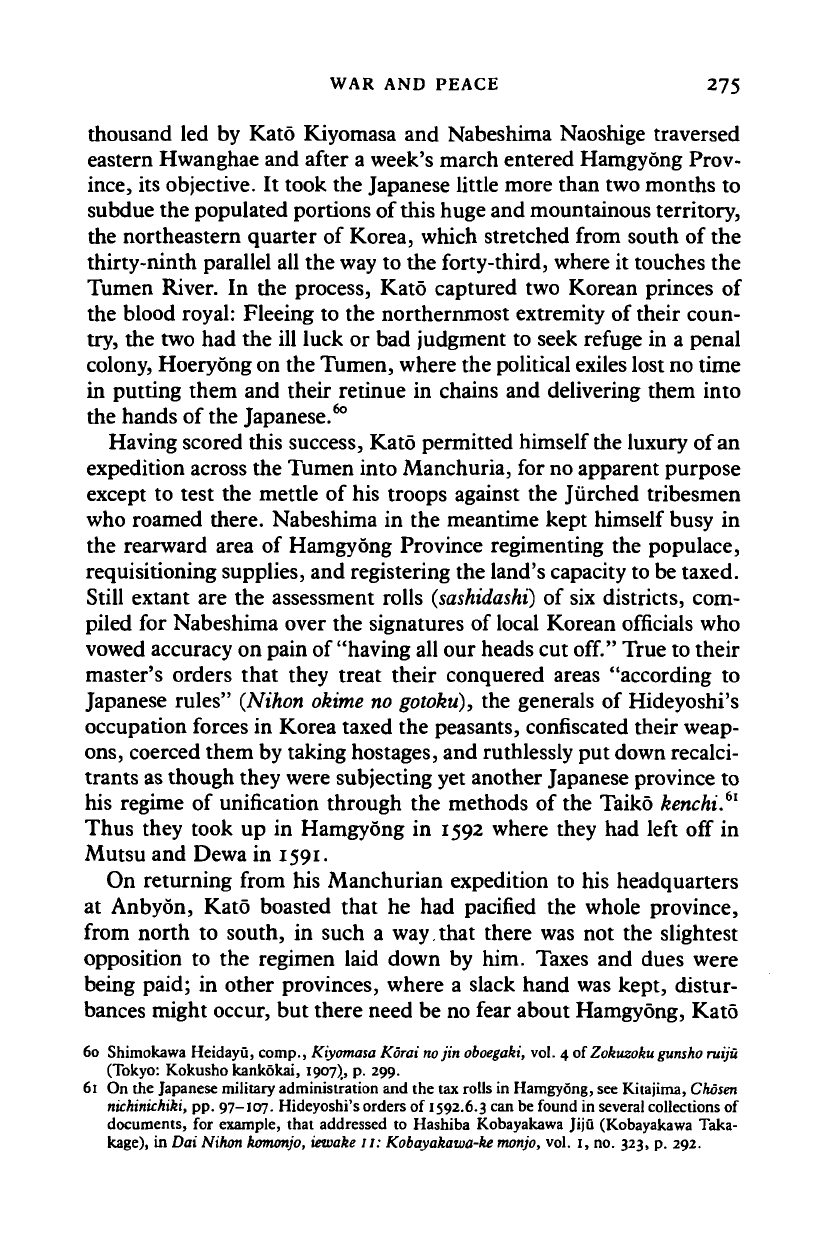
WAR AND PEACE 275
thousand led by Kato Kiyomasa and Nabeshima Naoshige traversed
eastern Hwanghae and after a week's march entered Hamgyong Prov-
ince,
its objective. It took the Japanese little more than two months to
subdue the populated portions of this huge and mountainous territory,
the northeastern quarter of Korea, which stretched from south of the
thirty-ninth parallel all the way to the forty-third, where it touches the
Tumen River. In the process, Kato captured two Korean princes of
the blood royal: Fleeing to the northernmost extremity of their coun-
try, the two had the ill luck or bad judgment to seek refuge in a penal
colony, Hoeryong on the Tumen, where the political exiles lost no time
in putting them and their retinue in chains and delivering them into
the hands of the Japanese.
60
Having scored this success, Kato permitted himself
the
luxury of an
expedition across the Tumen into Manchuria, for no apparent purpose
except to test the mettle of his troops against the Jiirched tribesmen
who roamed there. Nabeshima in the meantime kept himself busy in
the rearward area of Hamgyong Province regimenting the populace,
requisitioning supplies, and registering the land's capacity to be taxed.
Still extant are the assessment rolls
(sashidashi)
of six districts, com-
piled for Nabeshima over the signatures of local Korean officials who
vowed accuracy on pain of "having all our heads cut off." True to their
master's orders that they treat their conquered areas "according to
Japanese rules" (Nihon
okime
no
gotoku),
the generals of Hideyoshi's
occupation forces in Korea taxed the peasants, confiscated their weap-
ons,
coerced them by taking hostages, and ruthlessly put down recalci-
trants as though they were subjecting yet another Japanese province to
his regime of unification through the methods of the Taiko
kenchi.
61
Thus they took up in Hamgyong in 1592 where they had left off in
Mutsu and Dewa in 1591.
On returning from his Manchurian expedition to his headquarters
at Anbyon, Kato boasted that he had pacified the whole province,
from north to south, in such a way.that there was not the slightest
opposition to the regimen laid down by him. Taxes and dues were
being paid; in other provinces, where a slack hand was kept, distur-
bances might occur, but there need be no fear about Hamgyong, Kato
60 Shimokawa Heidayu, comp., Kiyomasa Korai nojin oboegaki, vol. 4 oiZokuzoku
gunsho ruiju
(Tokyo: Kokusho kankokai, 1907), p. 299.
61 On the Japanese military administration and the tax rolls in Hamgyong, see Kitajima,
Chosen
nichinichiki,
pp. 97-107. Hideyoshi's orders of 1592.6.3 can be found in several collections of
documents, for example, that addressed to Hashiba Kobayakawa Jiju (Kobayakawa Taka-
kage),
in Dai Nihon
komonjo,
iewake 11: Kobayakawa-ke
monjo,
vol. 1, no. 323, p. 292.
Cambridge Histories Online © Cambridge University Press, 2008
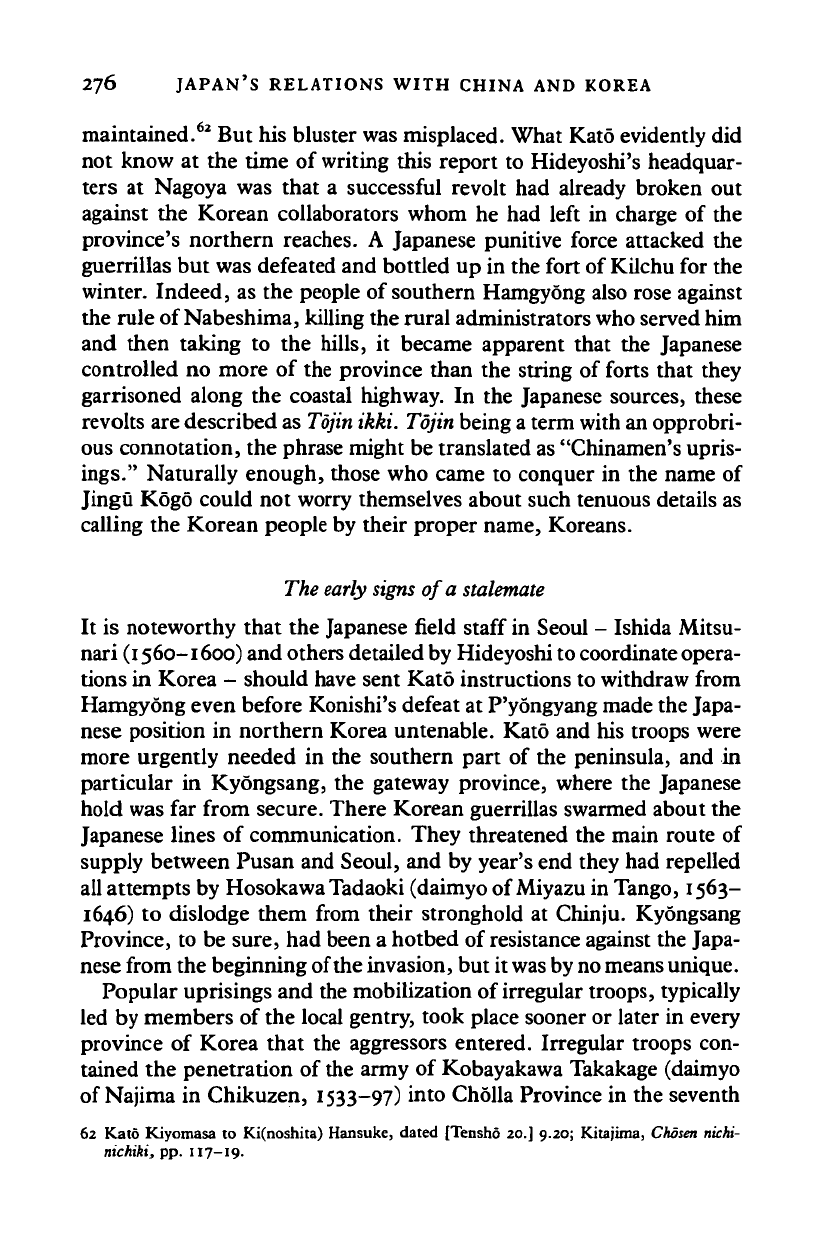
276 JAPAN'S RELATIONS WITH CHINA AND KOREA
maintained.
62
But his bluster was misplaced. What Kato evidently did
not know at the time of writing this report to Hideyoshi's headquar-
ters at Nagoya was that a successful revolt had already broken out
against the Korean collaborators whom he had left in charge of the
province's northern reaches. A Japanese punitive force attacked the
guerrillas but was defeated and bottled up in the fort of Kilchu for the
winter. Indeed, as the people of southern Hamgyong also rose against
the rule of Nabeshima, killing the rural administrators who served him
and then taking to the hills, it became apparent that the Japanese
controlled no more of the province than the string of forts that they
garrisoned along the coastal highway. In the Japanese sources, these
revolts are described as
Tojin
ikki.
Tojin
being
a
term with an opprobri-
ous connotation, the phrase might be translated as "Chinamen's upris-
ings."
Naturally enough, those who came to conquer in the name of
Jingu Kogo could not worry themselves about such tenuous details as
calling the Korean people by their proper name, Koreans.
The
early
signs of a stalemate
It is noteworthy that the Japanese field staff in Seoul - Ishida Mitsu-
nari (1560-1600) and others detailed by Hideyoshi to coordinate opera-
tions in Korea - should have sent Kato instructions to withdraw from
Hamgyong even before Konishi's defeat at P'yongyang made the Japa-
nese position in northern Korea untenable. Kato and his troops were
more urgently needed in the southern part of the peninsula, and in
particular in Kyongsang, the gateway province, where the Japanese
hold was far from secure. There Korean guerrillas swarmed about the
Japanese lines of communication. They threatened the main route of
supply between Pusan and Seoul, and by year's end they had repelled
all attempts by Hosokawa Tadaoki (daimyo of Miyazu in Tango, 1563-
1646) to dislodge them from their stronghold at Chinju. Kyongsang
Province, to be sure, had been a hotbed of resistance against the Japa-
nese from the beginning of the invasion, but it
was
by
no means
unique.
Popular uprisings and the mobilization of irregular troops, typically
led by members of the local gentry, took place sooner or later in every
province of Korea that the aggressors entered. Irregular troops con-
tained the penetration of the army of Kobayakawa Takakage (daimyo
of Najima in Chikuzen, 1533-97) into Cholla Province in the seventh
62 Kato Kiyomasa to Ki(noshita) Hansuke, dated [Tensho 20.] 9.20; Kitajima, Chosen nichi-
nichiki, pp. 117-19.
Cambridge Histories Online © Cambridge University Press, 2008
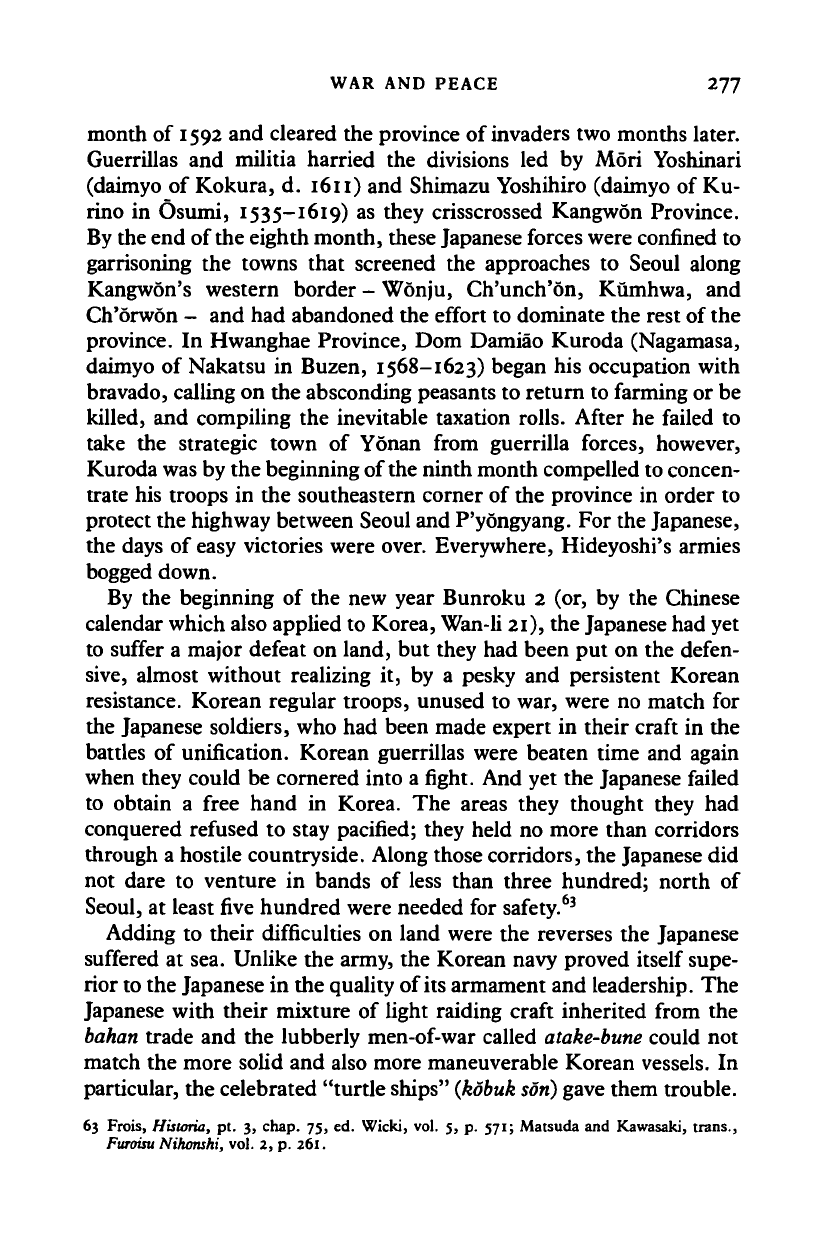
WAR AND PEACE 277
month of 1592 and cleared the province of invaders two months later.
Guerrillas and militia harried the divisions led by Mori Yoshinari
(daimyo of Kokura, d. 1611) and Shimazu Yoshihiro (daimyo of Ku-
rino in Osumi, 1535-1619) as they crisscrossed Kangwon Province.
By the end of the eighth month, these Japanese forces were confined to
garrisoning the towns that screened the approaches to Seoul along
Kangwon's western border - Wonju, Ch'unch'on, Kumhwa, and
Ch'orwon - and had abandoned the effort to dominate the rest of the
province. In Hwanghae Province, Dom Damiao Kuroda (Nagamasa,
daimyo of Nakatsu in Buzen, 1568-1623) began his occupation with
bravado, calling on the absconding peasants to return to farming or be
killed, and compiling the inevitable taxation rolls. After he failed to
take the strategic town of Yonan from guerrilla forces, however,
Kuroda was by the beginning of the ninth month compelled to concen-
trate his troops in the southeastern corner of the province in order to
protect the highway between Seoul and P'yongyang. For the Japanese,
the days of easy victories were over. Everywhere, Hideyoshi's armies
bogged down.
By the beginning of the new year Bunroku 2 (or, by the Chinese
calendar which also applied to Korea, Wan-li
21),
the Japanese had yet
to suffer a major defeat on land, but they had been put on the defen-
sive,
almost without realizing it, by a pesky and persistent Korean
resistance. Korean regular troops, unused to war, were no match for
the Japanese soldiers, who had been made expert in their craft in the
battles of unification. Korean guerrillas were beaten time and again
when they could be cornered into a fight. And yet the Japanese failed
to obtain a free hand in Korea. The areas they thought they had
conquered refused to stay pacified; they held no more than corridors
through a hostile countryside. Along those corridors, the Japanese did
not dare to venture in bands of less than three hundred; north of
Seoul, at least five hundred were needed for safety.
63
Adding to their difficulties on land were the reverses the Japanese
suffered at sea. Unlike the army, the Korean navy proved itself supe-
rior to the Japanese in the quality of its armament and leadership. The
Japanese with their mixture of light raiding craft inherited from the
bahan
trade and the lubberly men-of-war called
atake-bune
could not
match the more solid and also more maneuverable Korean vessels. In
particular, the celebrated "turtle ships"
(kobuk son)
gave them trouble.
63 Frois, Hisioria, pt. 3, chap. 75, ed. Wicki, vol. 5, p. 571; Matsuda and Kawasaki, trans.,
Furoisu
Nihonshi, vol. 2, p. 261.
Cambridge Histories Online © Cambridge University Press, 2008
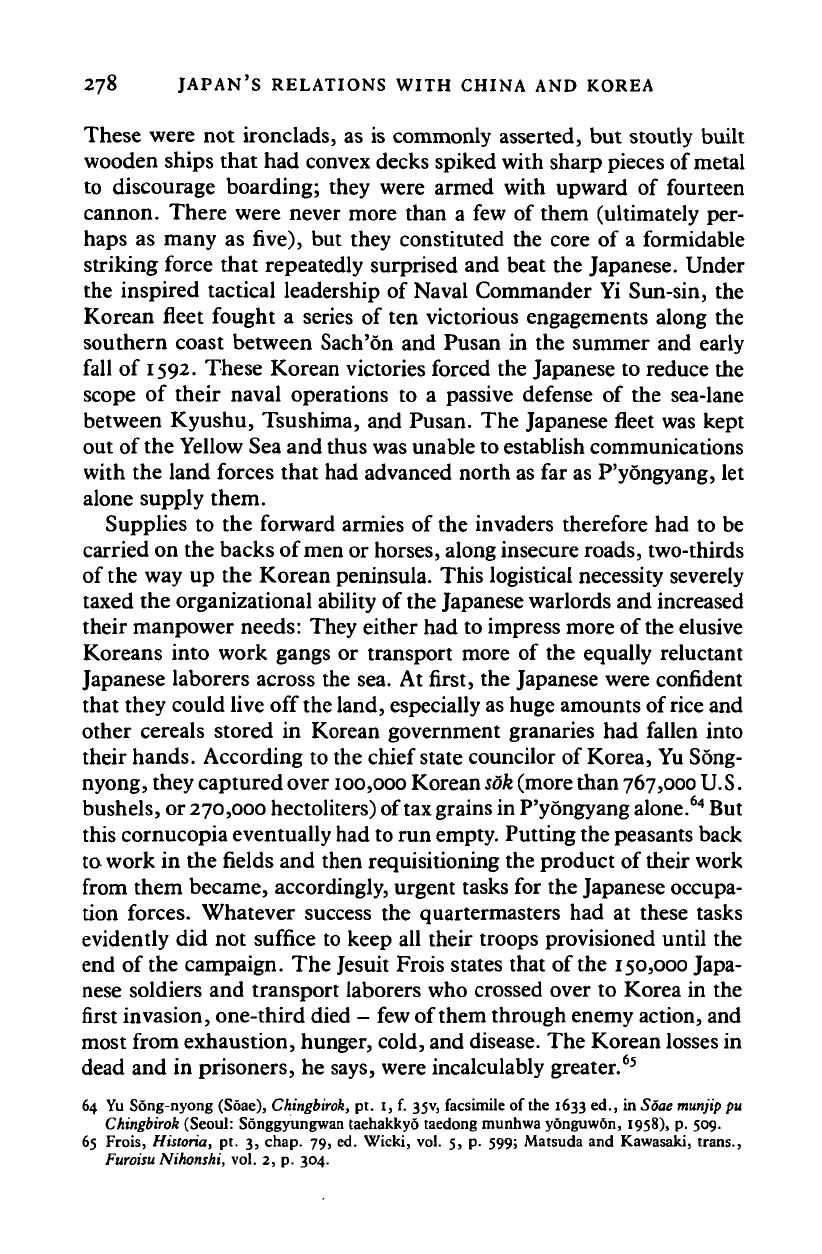
278 JAPAN'S RELATIONS WITH CHINA AND KOREA
These were not ironclads, as is commonly asserted, but stoutly built
wooden ships that had convex decks spiked with sharp pieces of metal
to discourage boarding; they were armed with upward of fourteen
cannon. There were never more than a few of them (ultimately per-
haps as many as five), but they constituted the core of a formidable
striking force that repeatedly surprised and beat the Japanese. Under
the inspired tactical leadership of Naval Commander Yi Sun-sin, the
Korean fleet fought a series of ten victorious engagements along the
southern coast between Sach'on and Pusan in the summer and early
fall of
1592.
These Korean victories forced the Japanese to reduce the
scope of their naval operations to a passive defense of the sea-lane
between Kyushu, Tsushima, and Pusan. The Japanese fleet was kept
out of the Yellow Sea and thus was unable to establish communications
with the land forces that had advanced north as far as P'yongyang, let
alone supply them.
Supplies to the forward armies of the invaders therefore had to be
carried on the backs of men or horses, along insecure roads, two-thirds
of the way up the Korean peninsula. This logistical necessity severely
taxed the organizational ability of the Japanese warlords and increased
their manpower needs: They either had to impress more of the elusive
Koreans into work gangs or transport more of the equally reluctant
Japanese laborers across the sea. At first, the Japanese were confident
that they could live off
the
land, especially as huge amounts of
rice
and
other cereals stored in Korean government granaries had fallen into
their hands. According to the chief state councilor of Korea, Yu Song-
nyong, they captured over 100,000 Korean
soft
(more than 767,000 U.S.
bushels, or 270,000 hectoliters) of tax grains in P'yongyang alone.
64
But
this cornucopia eventually had to run
empty.
Putting the peasants back
to work in the fields and then requisitioning the product of their work
from them became, accordingly, urgent tasks for the Japanese occupa-
tion forces. Whatever success the quartermasters had at these tasks
evidently did not suffice to keep all their troops provisioned until the
end of the campaign. The Jesuit Frois states that of the 150,000 Japa-
nese soldiers and transport laborers who crossed over to Korea in the
first invasion, one-third died - few of them through enemy action, and
most from exhaustion, hunger, cold, and disease. The Korean losses in
dead and in prisoners, he says, were incalculably greater.
65
64 Vu Song-nyong (Soae), Chingbirok, pt. I, f. 35V, facsimile of the 1633 ed., in Soae
munjip
pu
Chingbirok (Seoul: Songgyungwan taehakkyo taedong munhwa yonguwdn, 1958), p. 509.
65 Frois, Historia, pt. 3, chap. 79, ed. Wicki, vol. 5, p. 599; Matsuda and Kawasaki, trans.,
Furoisu
Nihonshi, vol. 2, p. 304.
Cambridge Histories Online © Cambridge University Press, 2008
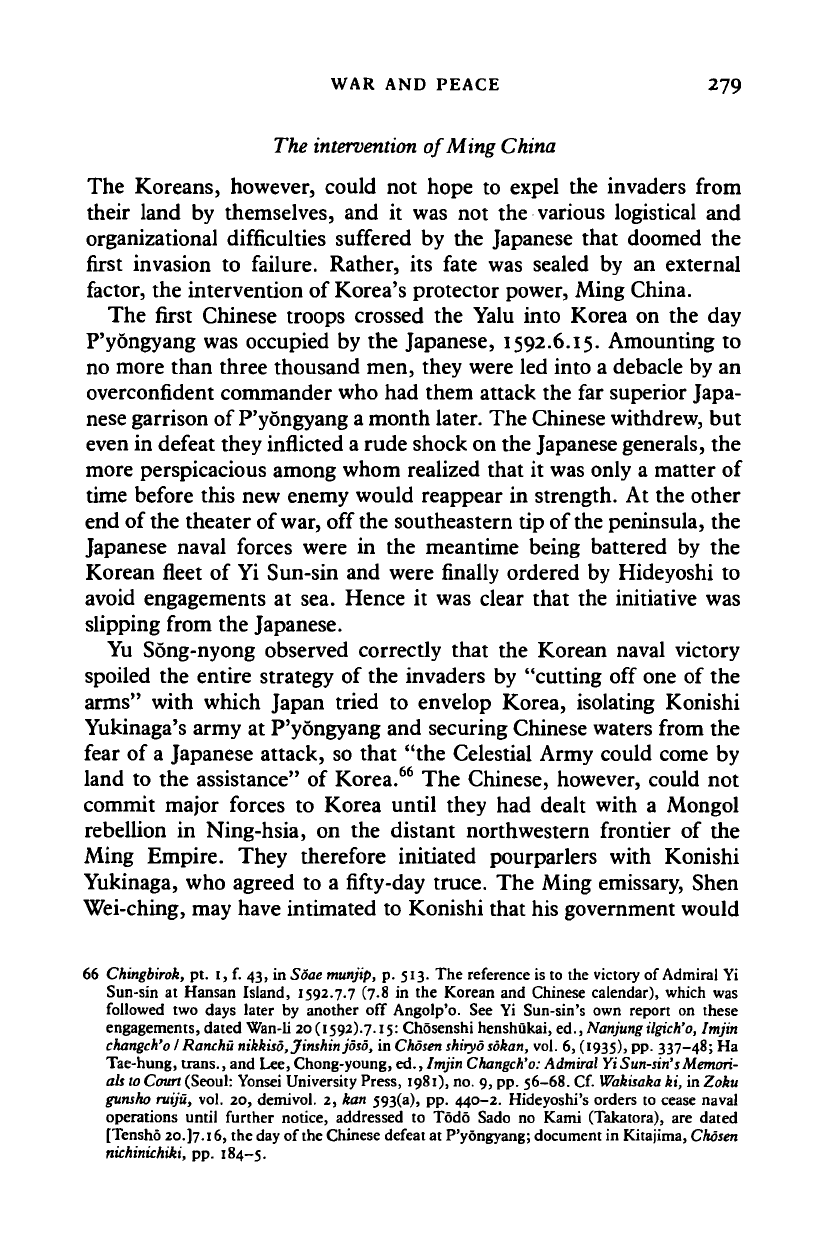
WAR AND PEACE 279
The intervention of Ming China
The Koreans, however, could not hope to expel the invaders from
their land by themselves, and it was not the various logistical and
organizational difficulties suffered by the Japanese that doomed the
first invasion to failure. Rather, its fate was sealed by an external
factor, the intervention of Korea's protector power, Ming China.
The first Chinese troops crossed the Yalu into Korea on the day
P'yongyang was occupied by the Japanese, 1592.6.15. Amounting to
no more than three thousand men, they were led into a debacle by an
overconfident commander who had them attack the far superior Japa-
nese garrison of P'yongyang
a
month later. The Chinese withdrew, but
even in defeat they inflicted a rude shock on the Japanese generals, the
more perspicacious among whom realized that it was only a matter of
time before this new enemy would reappear in strength. At the other
end of the theater of
war,
off the southeastern tip of
the
peninsula, the
Japanese naval forces were in the meantime being battered by the
Korean fleet of Yi Sun-sin and were finally ordered by Hideyoshi to
avoid engagements at sea. Hence it was clear that the initiative was
slipping from the Japanese.
Yu Song-nyong observed correctly that the Korean naval victory
spoiled the entire strategy of the invaders by "cutting off one of the
arms"
with which Japan tried to envelop Korea, isolating Konishi
Yukinaga's army at P'yongyang and securing Chinese waters from the
fear of a Japanese attack, so that "the Celestial Army could come by
land to the assistance" of Korea.
66
The Chinese, however, could not
commit major forces to Korea until they had dealt with a Mongol
rebellion in Ning-hsia, on the distant northwestern frontier of the
Ming Empire. They therefore initiated pourparlers with Konishi
Yukinaga, who agreed to a fifty-day truce. The Ming emissary, Shen
Wei-ching, may have intimated to Konishi that his government would
66 Chingbirok, pt. I, f. 43, in Soae munjip, p. 513. The reference is to the victory of Admiral Yi
Sun-sin at Hansan Island, 1592.7.7 (7.8 in the Korean and Chinese calendar), which was
followed two days later by another off Angolp'o. See Yi Sun-sin's own report on these
engagements, dated Wan-li 20 (1592).7.15: Chosenshi henshukai, ed.,Nanjungilgich'o, Imjin
changch'o I
Ranchunikkiso,Jinshinjdsd, in
Chosen shiryd
sokan,
vol. 6, (1935), pp. 337-48; Ha
Tae-hung, trans., and Lee, Chong-young, ed., Imjin
Changch'o:
Admiral Yi
Sun-sin's
Memori-
als to Court (Seoul: Yonsei University Press, 1981), no. 9, pp. 56-68. Cf.
Wakisaka
ki, in Zoku
gunsho ruiju, vol. 20, demivol. 2, kan 593(a), pp. 440-2. Hideyoshi's orders to cease naval
operations until further notice, addressed to Todo Sado no Kami (Takatora), are dated
[Tensho 20J7.16, the day of the Chinese defeat at P'yongyang; document in Kitajima,
Chosen
nichinichiki, pp. 184-5.
Cambridge Histories Online © Cambridge University Press, 2008
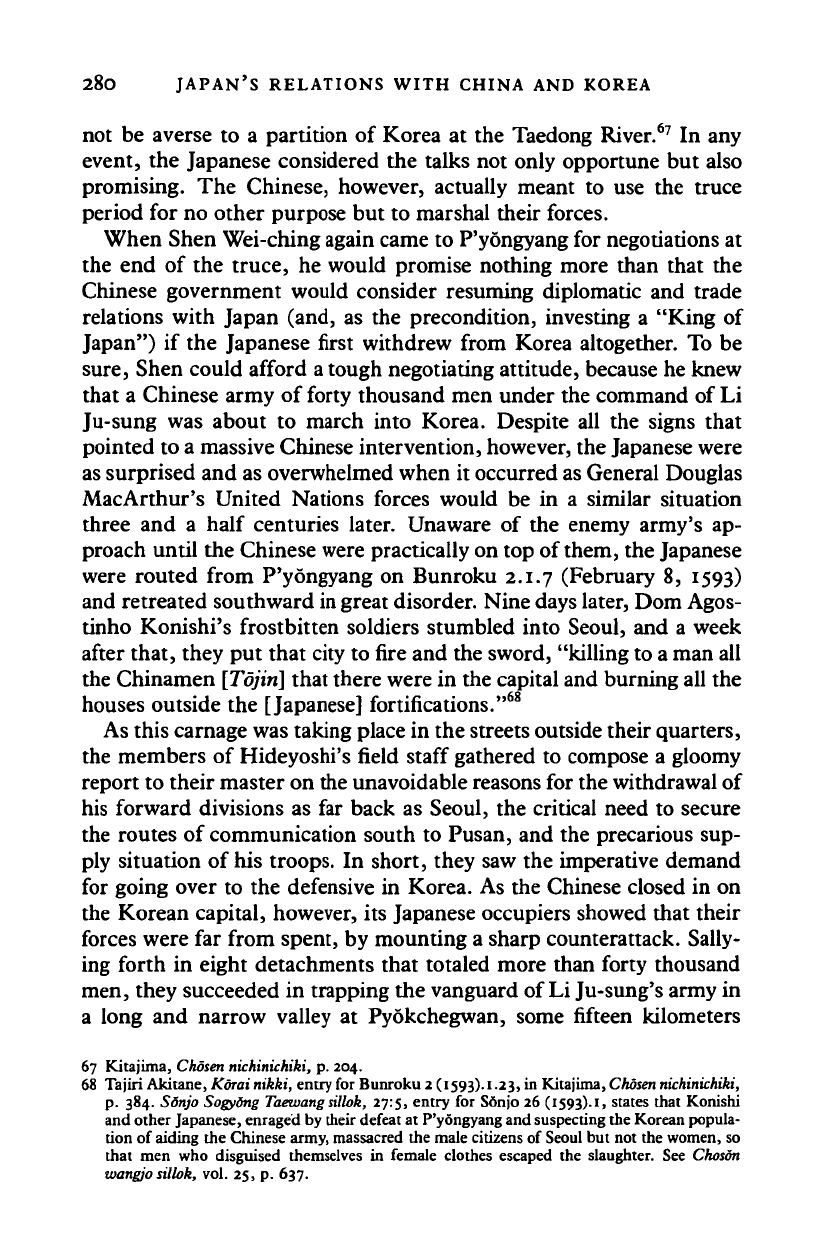
28O JAPAN'S RELATIONS WITH CHINA AND KOREA
not be averse to a partition of Korea at the Taedong River.
67
In any
event, the Japanese considered the talks not only opportune but also
promising. The Chinese, however, actually meant to use the truce
period for no other purpose but to marshal their forces.
When Shen Wei-ching again came to P'yongyang for negotiations at
the end of the truce, he would promise nothing more than that the
Chinese government would consider resuming diplomatic and trade
relations with Japan (and, as the precondition, investing a "King of
Japan") if the Japanese first withdrew from Korea altogether. To be
sure,
Shen could afford
a
tough negotiating attitude, because he knew
that a Chinese army of forty thousand men under the command of Li
Ju-sung was about to march into Korea. Despite all the signs that
pointed to a massive Chinese intervention, however, the Japanese were
as surprised and as overwhelmed when it occurred as General Douglas
MacArthur's United Nations forces would be in a similar situation
three and a half centuries later. Unaware of the enemy army's ap-
proach until the Chinese were practically on top of
them,
the Japanese
were routed from P'yongyang on Bunroku 2.1.7 (February 8, 1593)
and retreated southward in great disorder. Nine days later, Dom Agos-
tinho Konishi's frostbitten soldiers stumbled into Seoul, and a week
after that, they put that city to fire and the sword, "killing to a man all
the Chinamen
[Tojiri]
that there were in the capital and burning all the
houses outside the [Japanese] fortifications."
68
As this carnage was taking place in the streets outside their quarters,
the members of Hideyoshi's field staff gathered to compose a gloomy
report to their master on the unavoidable reasons for the withdrawal of
his forward divisions as far back as Seoul, the critical need to secure
the routes of communication south to Pusan, and the precarious sup-
ply situation of his troops. In short, they saw the imperative demand
for going over to the defensive in Korea. As the Chinese closed in on
the Korean capital, however, its Japanese occupiers showed that their
forces were far from spent, by mounting a sharp counterattack. Sally-
ing forth in eight detachments that totaled more than forty thousand
men, they succeeded in trapping the vanguard of Li Ju-sung's army in
a long and narrow valley at Pyokchegwan, some fifteen kilometers
67 Kitajima, Chosen nichinichiki, p. 204.
68 Tajiri Akitane, Korai nikki, entry for Bunroku 2 (1593). 1.23, in Kitajima,
Chosen
nichinichiki,
p.
384. Sonjo Sogydng Taewang sillok, 27:5, entry for S6njo 26 (1593)1, states that Konishi
and other Japanese, enraged by their defeat at P'yongyang and suspecting the Korean popula-
tion of aiding the Chinese army, massacred the male citizens of Seoul but not the women, so
that men who disguised themselves in female clothes escaped the slaughter. See Choson
wangjo sillok, vol. 25, p. 637.
Cambridge Histories Online © Cambridge University Press, 2008
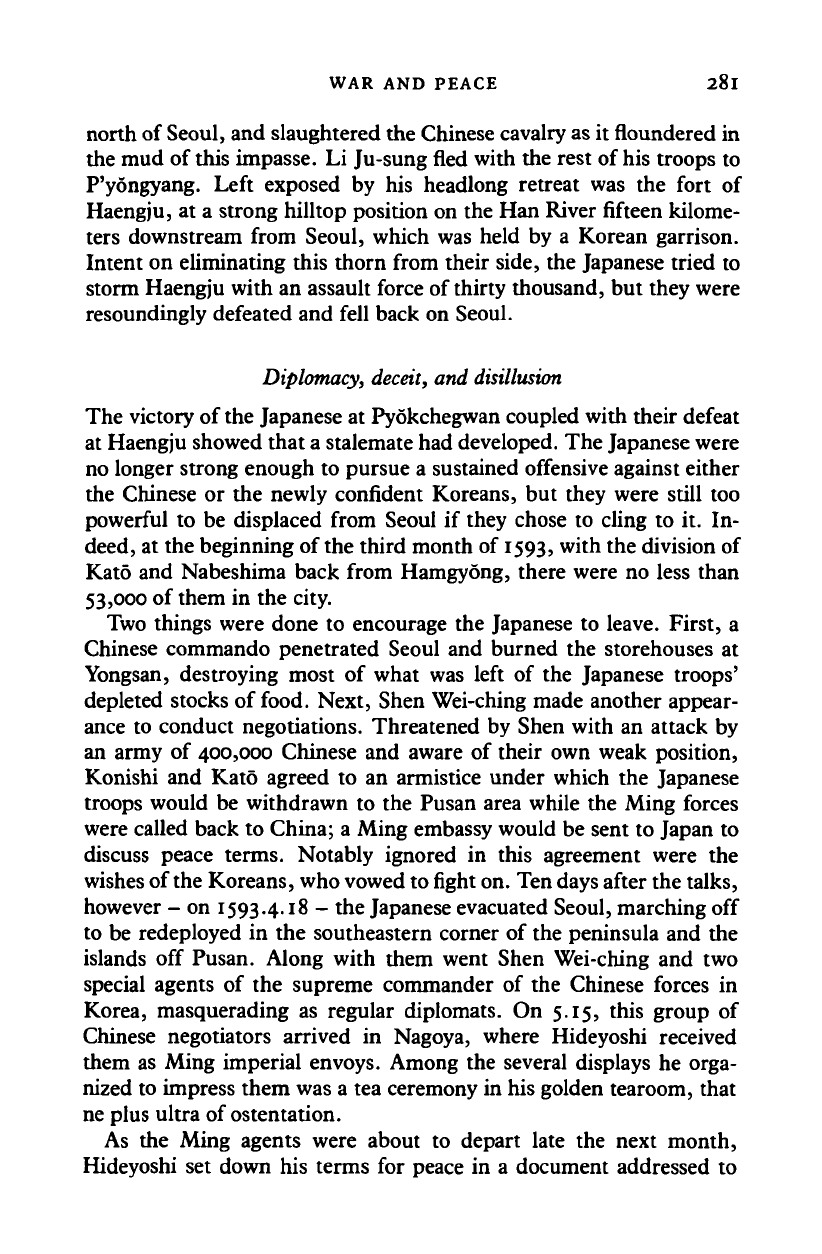
WAR AND PEACE 28l
north of
Seoul,
and slaughtered the Chinese cavalry as it floundered in
the mud of this impasse. Li Ju-sung fled with the rest of his troops to
P'yongyang. Left exposed by his headlong retreat was the fort of
Haengju, at a strong hilltop position on the Han River fifteen kilome-
ters downstream from Seoul, which was held by a Korean garrison.
Intent on eliminating this thorn from their side, the Japanese tried to
storm Haengju with an assault force of thirty thousand, but they were
resoundingly defeated and fell back on Seoul.
Diplomacy, deceit, and
disillusion
The victory of the Japanese at Pyokchegwan coupled with their defeat
at Haengju showed that a stalemate had developed. The Japanese were
no longer strong enough to pursue a sustained offensive against either
the Chinese or the newly confident Koreans, but they were still too
powerful to be displaced from Seoul if they chose to cling to it. In-
deed, at the beginning of the third month of
1593,
with the division of
Kato and Nabeshima back from Hamgyong, there were no less than
53,000 of them in the city.
Two things were done to encourage the Japanese to leave. First, a
Chinese commando penetrated Seoul and burned the storehouses at
Yongsan, destroying most of what was left of the Japanese troops'
depleted stocks of food. Next, Shen Wei-ching made another appear-
ance to conduct negotiations. Threatened by Shen with an attack by
an army of 400,000 Chinese and aware of their own weak position,
Konishi and Kato agreed to an armistice under which the Japanese
troops would be withdrawn to the Pusan area while the Ming forces
were called back to China; a Ming embassy would be sent to Japan to
discuss peace terms. Notably ignored in this agreement were the
wishes of the Koreans, who vowed to
fight
on. Ten days after the talks,
however - on 1593.4.18 - the Japanese evacuated Seoul, marching off
to be redeployed in the southeastern corner of the peninsula and the
islands off Pusan. Along with them went Shen Wei-ching and two
special agents of the supreme commander of the Chinese forces in
Korea, masquerading as regular diplomats. On 5.15, this group of
Chinese negotiators arrived in Nagoya, where Hideyoshi received
them as Ming imperial envoys. Among the several displays he orga-
nized to impress them was a tea ceremony in his golden tearoom, that
ne plus ultra of ostentation.
As the Ming agents were about to depart late the next month,
Hideyoshi set down his terms for peace in a document addressed to
Cambridge Histories Online © Cambridge University Press, 2008
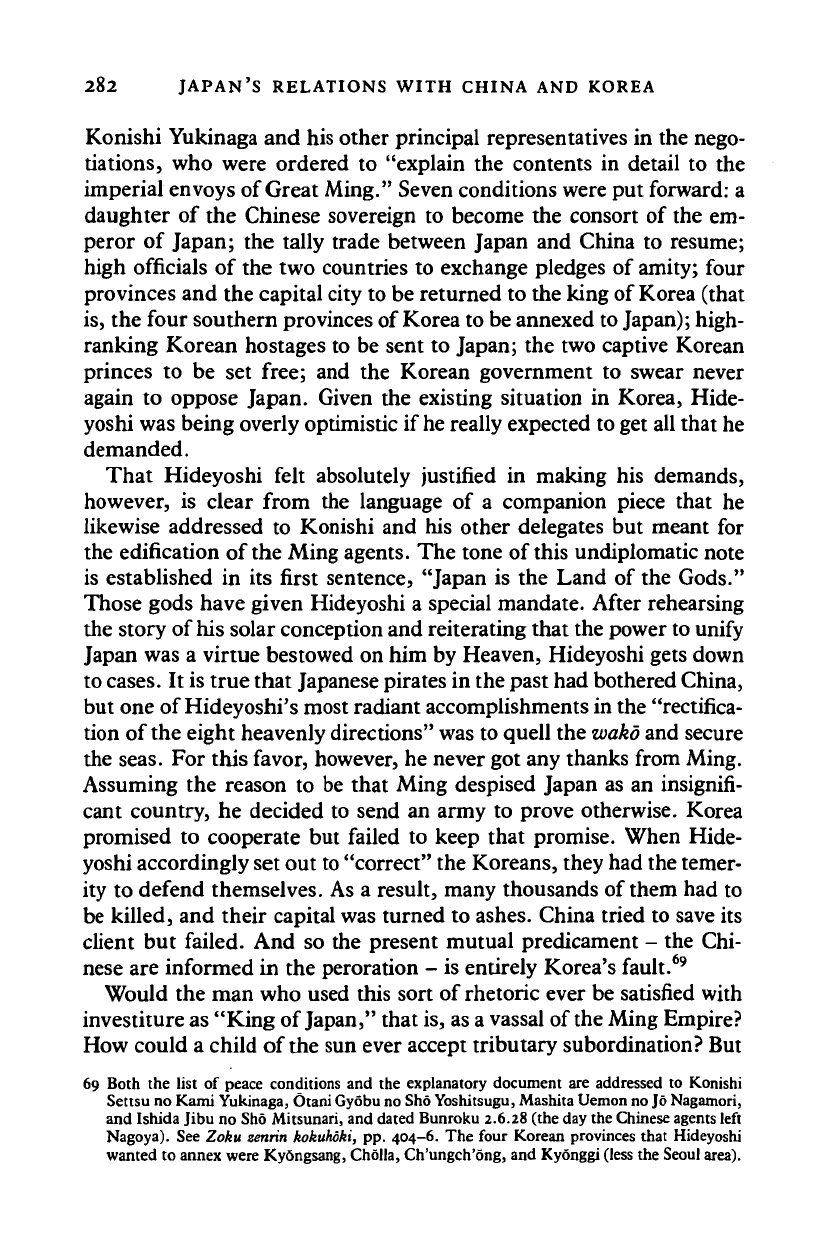
282 JAPAN'S RELATIONS WITH CHINA AND KOREA
Konishi Yukinaga and his other principal representatives in the nego-
tiations, who were ordered to "explain the contents in detail to the
imperial envoys of Great Ming." Seven conditions were put forward: a
daughter of the Chinese sovereign to become the consort of the em-
peror of Japan; the tally trade between Japan and China to resume;
high officials of the two countries to exchange pledges of amity; four
provinces and the capital city to be returned to the king of Korea (that
is,
the four southern provinces of Korea to be annexed to
Japan);
high-
ranking Korean hostages to be sent to Japan; the two captive Korean
princes to be set free; and the Korean government to swear never
again to oppose Japan. Given the existing situation in Korea, Hide-
yoshi was being overly optimistic if he really expected to get all that he
demanded.
That Hideyoshi felt absolutely justified in making his demands,
however, is clear from the language of a companion piece that he
likewise addressed to Konishi and his other delegates but meant for
the edification of the Ming agents. The tone of this undiplomatic note
is established in its first sentence, "Japan is the Land of the Gods."
Those gods have given Hideyoshi a special mandate. After rehearsing
the story of his solar conception and reiterating that the power to unify
Japan was a virtue bestowed on him by Heaven, Hideyoshi gets down
to
cases.
It is true that Japanese pirates in the past had bothered China,
but one of Hideyoshi's most radiant accomplishments in the "rectifica-
tion of the eight heavenly directions" was to quell the
wako
and secure
the seas. For this favor, however, he never got any thanks from Ming.
Assuming the reason to be that Ming despised Japan as an insignifi-
cant country, he decided to send an army to prove otherwise. Korea
promised to cooperate but failed to keep that promise. When Hide-
yoshi accordingly set out to "correct" the Koreans, they had the temer-
ity to defend themselves. As a result, many thousands of them had to
be killed, and their capital was turned to ashes. China tried to save its
client but failed. And so the present mutual predicament - the Chi-
nese are informed in the peroration - is entirely Korea's fault.
69
Would the man who used this sort of rhetoric ever be satisfied with
investiture as "King of Japan," that is, as a vassal of the Ming Empire?
How could a child of the sun ever accept tributary subordination? But
69 Both the list of peace conditions and the explanatory document are addressed to Konishi
Settsu no Kami Yukinaga, Otani Gyobu no Sho Yoshitsugu, Mashita Uemon no Jo Nagamori,
and Ishida Jibu no Sho Mitsunari, and dated Bunroku 2.6.28 (the day the Chinese agents left
Nagoya). See Zoku zenrin kokuhoki, pp. 404-6. The four Korean provinces that Hideyoshi
wanted to annex were Kyongsang, Cholla, Ch'ungch'ong, and Kyonggi (less the Seoul area).
Cambridge Histories Online © Cambridge University Press, 2008
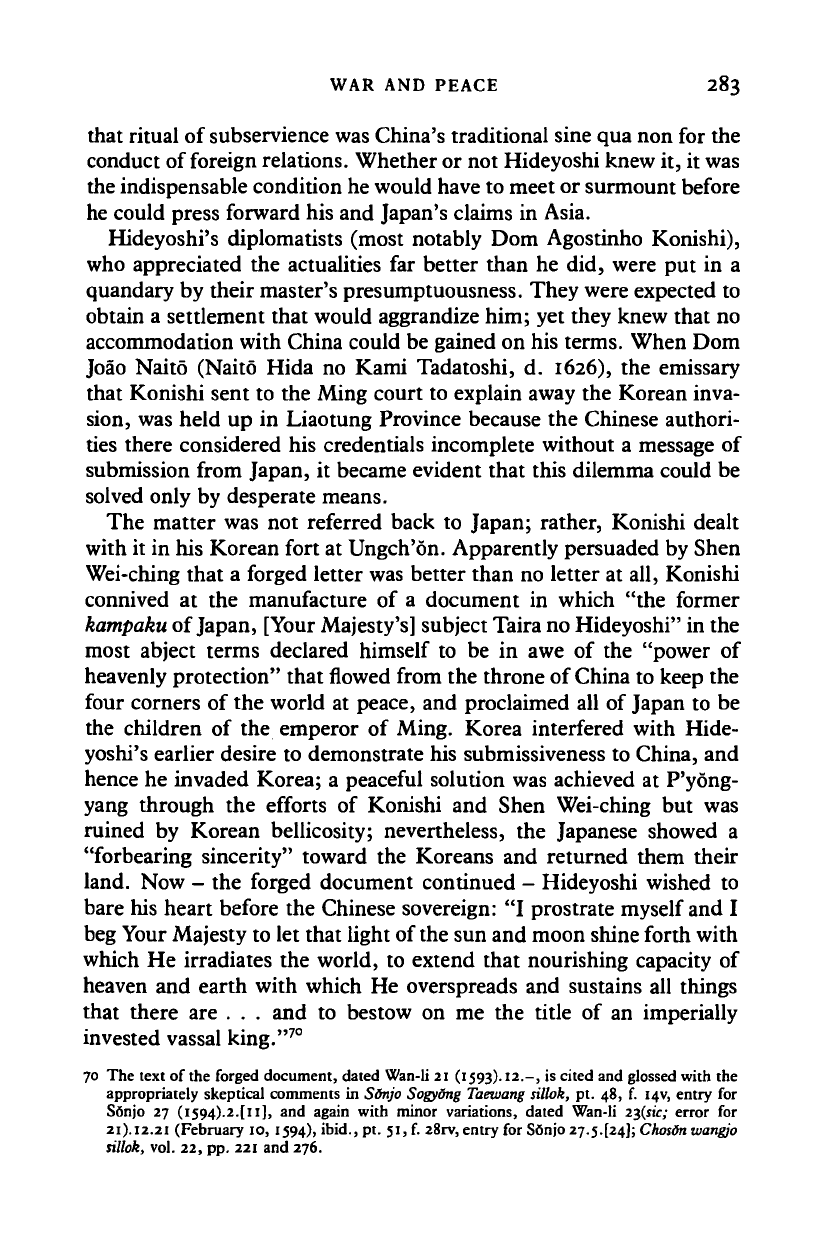
WAR AND PEACE 283
that ritual of subservience was China's traditional sine qua non for the
conduct of foreign relations. Whether or not Hideyoshi knew it, it was
the indispensable condition he would have to meet or surmount before
he could press forward his and Japan's claims in Asia.
Hideyoshi's diplomatists (most notably Dom Agostinho Konishi),
who appreciated the actualities far better than he did, were put in a
quandary by their master's presumptuousness. They were expected to
obtain a settlement that would aggrandize him; yet they knew that no
accommodation with China could be gained on his terms. When Dom
Joao Naito (Naito Hida no Kami Tadatoshi, d. 1626), the emissary
that Konishi sent to the Ming court to explain away the Korean inva-
sion, was held up in Liaotung Province because the Chinese authori-
ties there considered his credentials incomplete without a message of
submission from Japan, it became evident that this dilemma could be
solved only by desperate means.
The matter was not referred back to Japan; rather, Konishi dealt
with it in his Korean fort at Ungch'on. Apparently persuaded by Shen
Wei-ching that a forged letter was better than no letter at all, Konishi
connived at the manufacture of a document in which "the former
kampaku
of Japan, [Your Majesty's] subject Taira no Hideyoshi" in the
most abject terms declared himself to be in awe of the "power of
heavenly protection" that flowed from the throne of China to keep the
four corners of the world at peace, and proclaimed all of Japan to be
the children of the emperor of Ming. Korea interfered with Hide-
yoshi's earlier desire to demonstrate his submissiveness to China, and
hence he invaded Korea; a peaceful solution was achieved at P'yong-
yang through the efforts of Konishi and Shen Wei-ching but was
ruined by Korean bellicosity; nevertheless, the Japanese showed a
"forbearing sincerity" toward the Koreans and returned them their
land. Now - the forged document continued - Hideyoshi wished to
bare his heart before the Chinese sovereign: "I prostrate myself and I
beg Your Majesty to let that light of the sun and moon shine forth with
which He irradiates the world, to extend that nourishing capacity of
heaven and earth with which He overspreads and sustains all things
that there are . . . and to bestow on me the title of an imperially
invested vassal king."
70
70 The text of the forged document, dated Wan-li 21 (1593). 12.-, is cited and glossed with the
appropriately skeptical comments in Sdnjo Sogyong Taewang sillok, pt. 48, f. 14V, entry for
Sonjo 27 (1594).2.[11], and again with minor variations, dated Wan-li 23(1117 error for
21).
12.21 (February 10,1594), ibid., pt. 51, f. 28rv, entry for S6njo
27.5.[24];
Chosdn
wangjo
sillok, vol. 22, pp. 221 and 276.
Cambridge Histories Online © Cambridge University Press, 2008
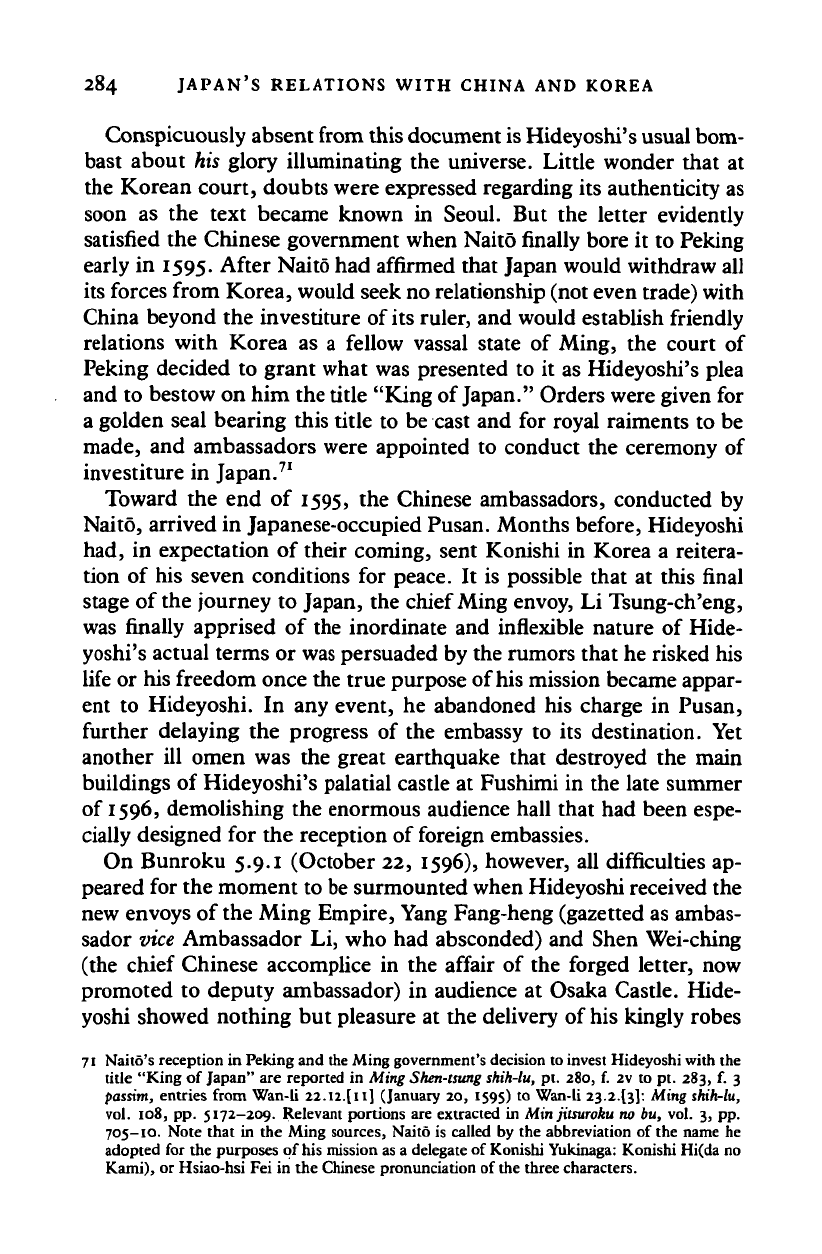
284 JAPAN'S RELATIONS WITH CHINA AND KOREA
Conspicuously absent from this document
is
Hideyoshi's usual bom-
bast about his glory illuminating the universe. Little wonder that at
the Korean court, doubts were expressed regarding its authenticity as
soon as the text became known in Seoul. But the letter evidently
satisfied the Chinese government when Naito finally bore it to Peking
early in 1595. After Naito had affirmed that Japan would withdraw all
its forces from Korea, would seek no relationship (not even trade) with
China beyond the investiture of its ruler, and would establish friendly
relations with Korea as a fellow vassal state of Ming, the court of
Peking decided to grant what was presented to it as Hideyoshi's plea
and to bestow on him the title "King of Japan." Orders were given for
a golden seal bearing this title to be cast and for royal raiments to be
made, and ambassadors were appointed to conduct the ceremony of
investiture in Japan.
71
Toward the end of 1595, the Chinese ambassadors, conducted by
Naito, arrived in Japanese-occupied Pusan. Months before, Hideyoshi
had, in expectation of their coming, sent Konishi in Korea a reitera-
tion of his seven conditions for peace. It is possible that at this final
stage of the journey to Japan, the chief Ming envoy, Li Tsung-ch'eng,
was finally apprised of the inordinate and inflexible nature of Hide-
yoshi's actual terms or was persuaded by the rumors that he risked his
life or his freedom once the true purpose of his mission became appar-
ent to Hideyoshi. In any event, he abandoned his charge in Pusan,
further delaying the progress of the embassy to its destination. Yet
another ill omen was the great earthquake that destroyed the main
buildings of Hideyoshi's palatial castle at Fushimi in the late summer
of 1596, demolishing the enormous audience hall that had been espe-
cially designed for the reception of foreign embassies.
On Bunroku 5.9.1 (October 22, 1596), however, all difficulties ap-
peared for the moment to be surmounted when Hideyoshi received the
new envoys of the Ming Empire, Yang Fang-heng (gazetted as ambas-
sador vice Ambassador Li, who had absconded) and Shen Wei-ching
(the chief Chinese accomplice in the affair of the forged letter, now
promoted to deputy ambassador) in audience at Osaka Castle. Hide-
yoshi showed nothing but pleasure at the delivery of his kingly robes
71 Naito's reception in Peking and the Ming government's decision to invest Hideyoshi with the
title "King of
Japan"
are reported in Ming
Shen-tsung
shih-lu,
pt. 280, f. 2v to pt. 283, f. 3
passim, entries from Wan-li 22.12.[11] (January 20, 1595) to Wan-li
23.2.[3]:
Ming shih-lu,
vol. 108, pp. 5172-209. Relevant portions are extracted in Min
jilsuroku
no bu, vol. 3, pp.
705-10. Note that in the Ming sources, Naito is called by the abbreviation of the name he
adopted for the purposes of his mission as a delegate of Konishi Yukinaga: Konishi Hi(da no
Kami), or Hsiao-hsi Fei in the Chinese pronunciation of the three characters.
Cambridge Histories Online © Cambridge University Press, 2008
